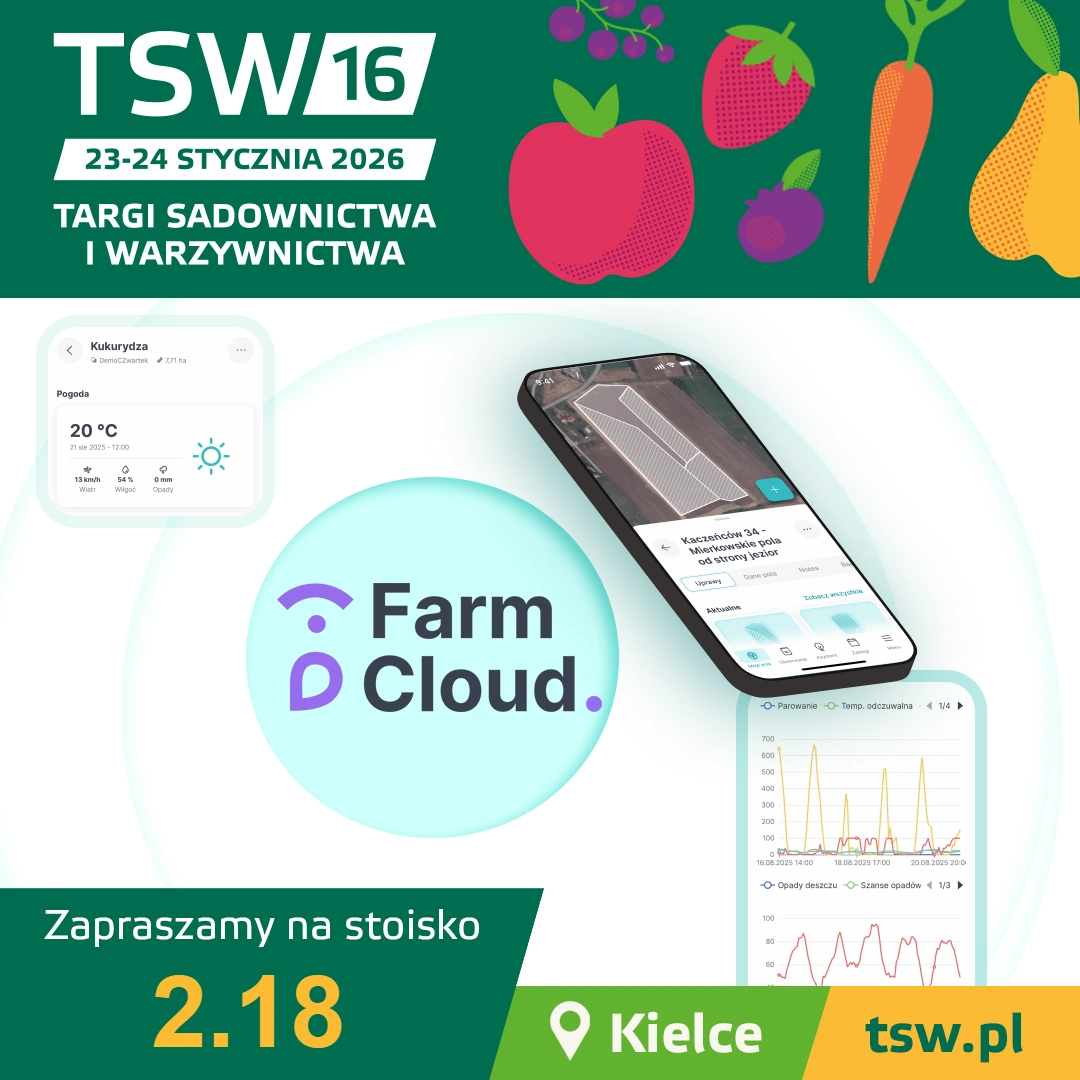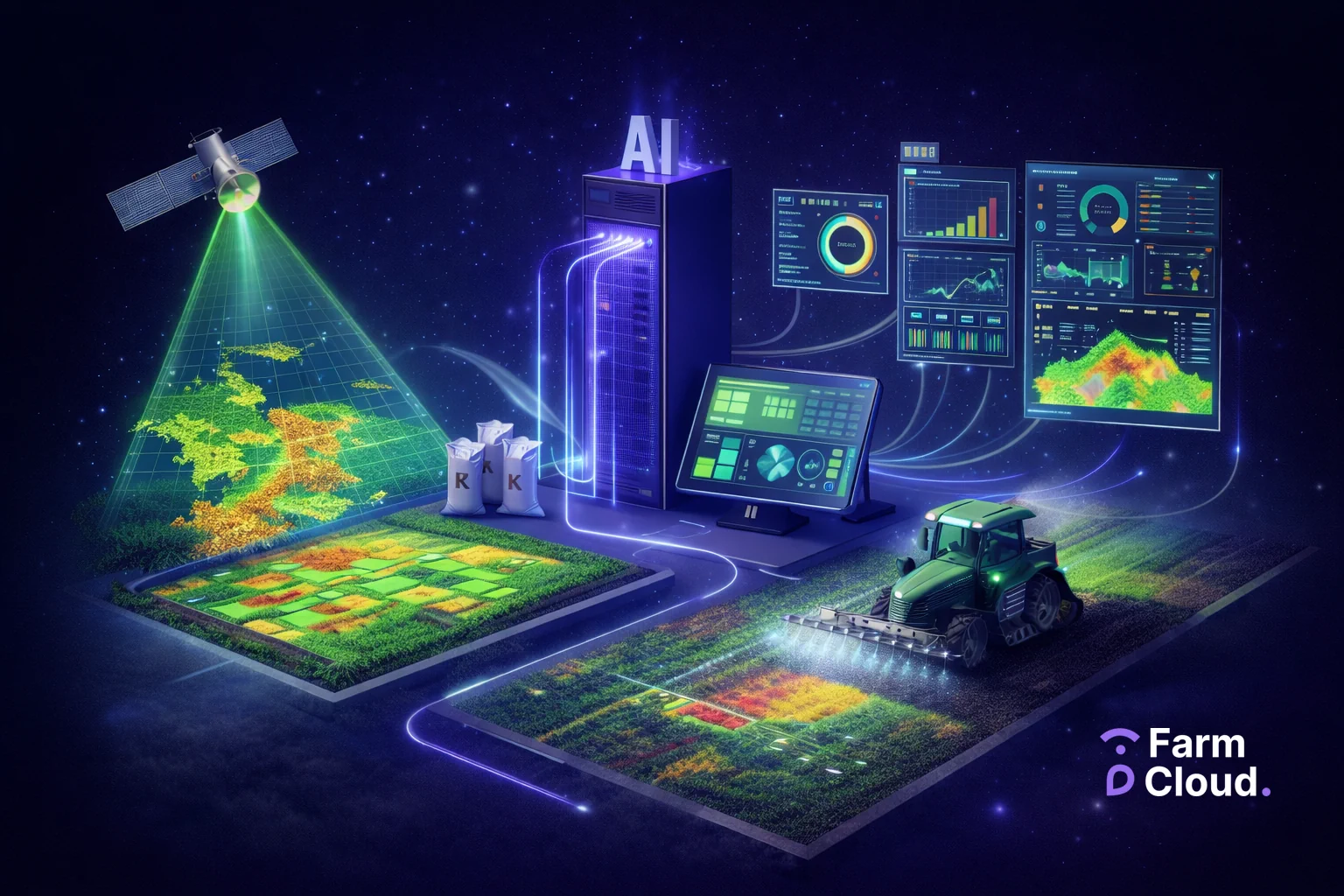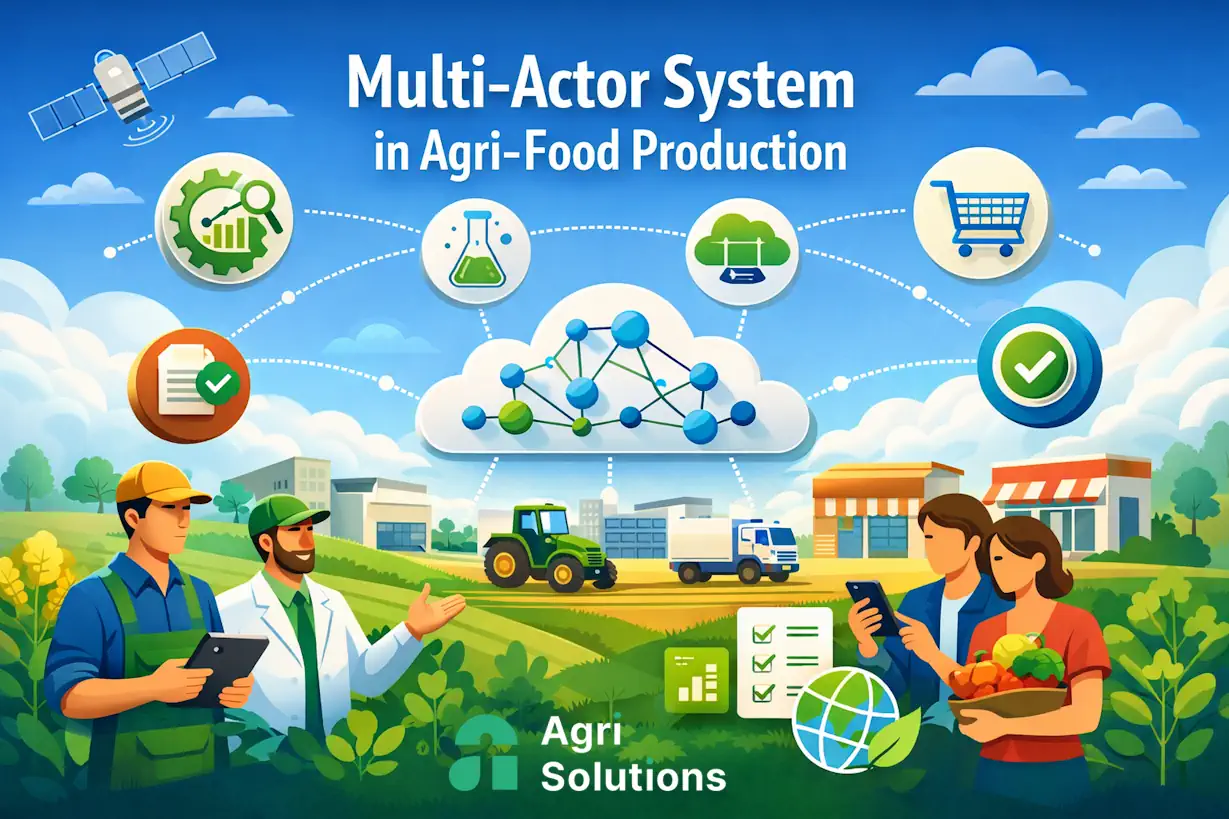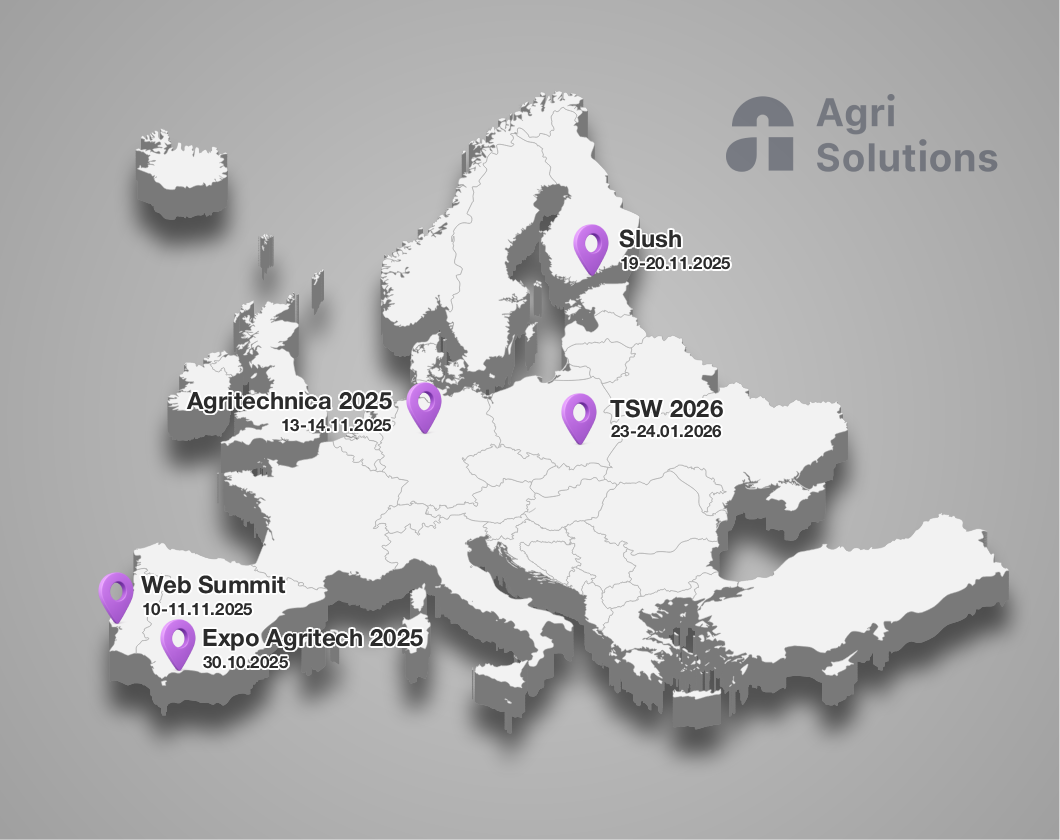Collaboration Among Supply Chain Stakeholders
FarmCloud integrates the activities of farmers, consulting firms, and processors, enabling the monitoring and optimization of agricultural production at every stage. Through the FarmPortal and FoodPass applications, farming suppliers can register their activities either manually or automatically using IoT sensors and devices.
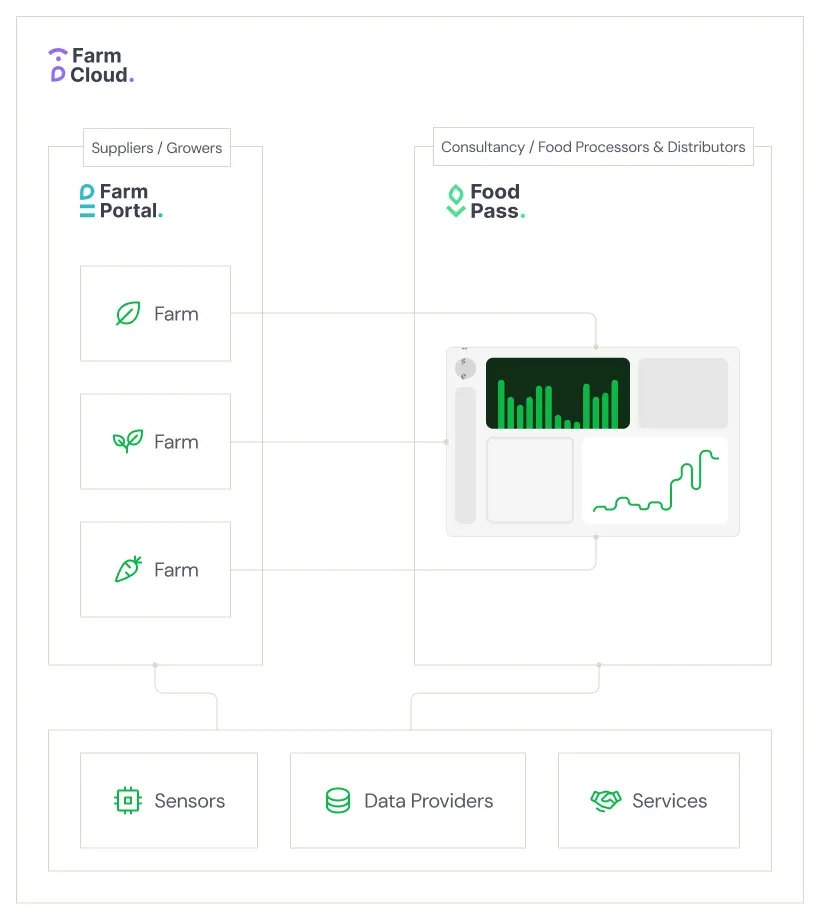
Typically, partners of farming suppliers provide the FarmPortal application to farmers free of charge for managing the farm and monitoring crop health. FoodPass is directly integrated with FarmPortal – this integration enables controlled access to selected data, remote consulting, documentation management, and supply chain monitoring.
FarmPortal functions as an operational platform that supports agricultural producers in:
- irrigation,
- fertilization,
- plant protection.
Consultants, agronomists, advisors, and processors can continuously verify the data entered, export it, and perform analyses. The collected documentation may serve as the basis for issuing emission certificates. Additionally, FoodPass enables quality control and traceability of products at the distribution stage through supplier activity verification, documentation management, and digital passports.
How Does FarmCloud Help Monitor Environmental Impact?
Environmental Aspect of ESG
FarmCloud provides farmers and companies with tools that enable the monitoring and reduction of carbon footprints as well as other key environmental indicators. The platform allows for:
- Recording all relevant data on crops, machinery operations, and employee activities.
- Monitoring CO₂ emissions – registering and analyzing data related to fuel consumption, fertilizers, plant protection products, water usage, and many other parameters associated with farm management.
- Calculating the carbon footprint in accordance with IPCC standards – FarmCloud automatically analyzes emission data based on the guidelines of the Intergovernmental Panel on Climate Change (IPCC), which allows for precise reporting and compliance with climate regulations. Every farming operation triggers an automatic recalculation of the carbon dioxide and nitrogen balances.
- Water management – tracking water consumption and optimizing irrigation through integration with soil sensors and weather stations. By combining these data with yield information, the system calculates water usage per unit mass of the product.
- Measuring the water footprint using sensor data – with IoT integration, the platform collects and analyzes water usage data, thereby optimizing water resource utilization.
- Biodiversity protection – analyzing the impact of agricultural activities on the ecosystem and implementing regenerative strategies.
Social Aspect of ESG – Supporting Employee and Community Well-Being
FarmCloud aids in managing the social aspects of ESG by:
- Monitoring working conditions – recording working hours and safety conditions for agricultural workers.
- Managing training programs – providing access to educational programs on sustainable agriculture and technological innovations.
- Supporting local communities – analyzing the impact of agricultural activities on the local economy and social environment.
Corporate Governance – Transparency and Compliance
Regarding corporate governance, FarmCloud enables:
- Automatic reporting in compliance with regulations – generating ESG reports in accordance with the requirements of GRI, CSRD, ESRS, and other international standards.
- Managing compliance with certifications – monitoring environmental and quality standards (e.g., GlobalGAP, organic agricultural certifications).
- Secure data storage – ensuring compliance with data protection regulations (such as GDPR) and maintaining transparency in information management.
Collaboration of Consulting Firms with the Agri-Food Sector
Consulting firms can leverage FarmCloud as a tool to support their collaboration with the agri-food sector by:
- Providing ESG strategy consulting – analyzing and optimizing agricultural operations in line with ESG standards.
- Supporting companies in reporting – preparing ESG reports based on the data collected by FarmCloud.
- Auditing farms – monitoring compliance with sustainable agriculture standards and preparing recommendations for producers.
- Integrating with the supply chain – delivering key ESG indicators to food companies, thus enabling transparency and the enhancement of sustainable practices throughout the ecosystem. FarmCloud can be deployed on company servers, increasing integration potential with ERP, MRP, or other systems.
Emission Exchange in the Supply Chain
FarmCloud offers solutions that allow for the aggregation and rewarding of emissions from collaborating farms. Farming suppliers who take actions to reduce harmful gas emissions can obtain ETS certificates, which can then be sold to other companies within the production and distribution chain of agri-food products that do not meet their emission commitments. Companies can purchase these certificates from their farming suppliers as part of managing their environmental obligations. Such transactions help companies meet their “emission reduction” targets and implement sustainable development policies.
How Does It Work?
- Farmers implement sustainable agricultural practices such as reducing CO₂ emissions, sequestering carbon in the soil, or managing water. In these tasks, they are supported by an integrated decision support system, remote consulting, and best practice guidelines embedded within the platform.
- The “emission certificate” confirms the reduction of greenhouse gas emissions, verified by advisors or consulting firms.
- On FarmCloud’s internal exchange, entities collaborating with farmers can aggregate these certificates and reward farming suppliers with better financial rates or product vouchers.
In the traditional EU ETS system, the agricultural sector is typically excluded, meaning companies cannot directly purchase ETS allowances from their farming suppliers. However, within voluntary emission reduction schemes or carbon credit generation programs, farmers can earn certified credits for implementing sustainable, low-emission practices. In such cases, companies seeking to offset their own emissions can purchase these credits from farmers, provided that transactions comply with applicable regulations and verification requirements. It is essential that all such operations are conducted in line with national and international regulations and validated by appropriate certifications.
Summary
Thanks to FarmCloud, agricultural companies can effectively manage their ESG data, minimize regulatory risks, and enhance their competitiveness in the market. The automation of reporting processes and access to advanced analytics not only help meet formal requirements but also actively improve environmental and social outcomes. In an era of sustainable development and increasing business accountability, FarmCloud is becoming a key tool in supporting modern agriculture to adapt to ESG requirements.

